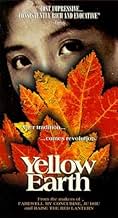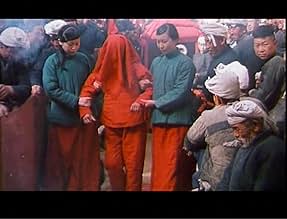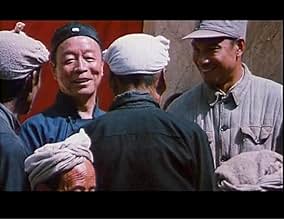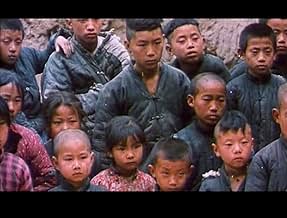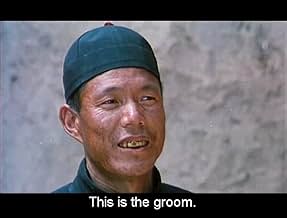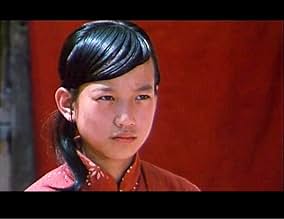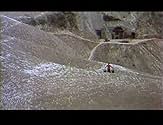CALIFICACIÓN DE IMDb
7.1/10
2.7 k
TU CALIFICACIÓN
Agrega una trama en tu idiomaA communist soldier travels to Shanbei to collect folk songs for propaganda while visiting a poor peasant family, giving hope to the teenage daughter in escaping an arranged marriage.A communist soldier travels to Shanbei to collect folk songs for propaganda while visiting a poor peasant family, giving hope to the teenage daughter in escaping an arranged marriage.A communist soldier travels to Shanbei to collect folk songs for propaganda while visiting a poor peasant family, giving hope to the teenage daughter in escaping an arranged marriage.
- Dirección
- Guionistas
- Elenco
- Premios
- 8 premios ganados y 5 nominaciones en total
- Dirección
- Guionistas
- Todo el elenco y el equipo
- Producción, taquilla y más en IMDbPro
Opiniones destacadas
Not far from the yellow river there is a big area where the earth also is yellow and the climate and living are very harsh, this time because of a drought. First we see a wedding ceremony with the bride little more than 12 years old, a happy occasion for everyone except for the skeptical onlooking Cuiqiao whose fate will be similar in short time and the bride herself. Enter folk song collector comrade Gu who stays with her family for some time. His talk of whats going on in the south, the end of arranged weddings and equality of women sets a deep impression on Cuiqiao, but also her mute brother.
Much of the film is told in its folk songs and its pictures. Cuiqiaos misery is told with songs: "of all the people//girls are the most miserable" and her new hope with the songs of the Party.
The pictures leave much room for the environments to sink in. Distances are big and the landscape homogeneous, that is earth covered mountains and a wide yellow river. In a setting such as this, the figures get small, and even more so by the devotion Zhang Yimou gives to the vast sky.
Much of the film is told in its folk songs and its pictures. Cuiqiaos misery is told with songs: "of all the people//girls are the most miserable" and her new hope with the songs of the Party.
The pictures leave much room for the environments to sink in. Distances are big and the landscape homogeneous, that is earth covered mountains and a wide yellow river. In a setting such as this, the figures get small, and even more so by the devotion Zhang Yimou gives to the vast sky.
This film is Chen Kaige's masterpiece. Although he would eventually direct the more financially successful Devil on the Doorstep (another great Kaige film), this one packs more emotional wallop. The cinematography is very impressive, and led to the emergence of Zhang Yimou as China's greatest filmmaker of all time in the later 80s and all of the 90. A picture is worth a thousand words, and this film shows why. The story unfolds because of images, not because of dialogue.
The only other films of great note before this one, that showed the effects of poverty in China were Spring in a Small Village and San Mao (Three Hairs). Most other Chinese films were filled with excessive CCP dialogue extolling the virtues of socialism. It is much better to show it than to speak it.
Gu Quing plays the CCP soldier who works as a propagandist for village folk song research, and Ba Xue plays the young girl, who is sold into indentured slavery by ancient Chinese cultural traditions. The soldier affects both her and her younger brother. I will not reveal the outcome of these relationships, as it would spoil your enjoyment of the film. One of the best 150 Chinese films ever made, and probably in the top ten.
Gu Quing - The Soldier(as Xueyin Wang) Bai Xue - The Young Farmgirl.
The only other films of great note before this one, that showed the effects of poverty in China were Spring in a Small Village and San Mao (Three Hairs). Most other Chinese films were filled with excessive CCP dialogue extolling the virtues of socialism. It is much better to show it than to speak it.
Gu Quing plays the CCP soldier who works as a propagandist for village folk song research, and Ba Xue plays the young girl, who is sold into indentured slavery by ancient Chinese cultural traditions. The soldier affects both her and her younger brother. I will not reveal the outcome of these relationships, as it would spoil your enjoyment of the film. One of the best 150 Chinese films ever made, and probably in the top ten.
Gu Quing - The Soldier(as Xueyin Wang) Bai Xue - The Young Farmgirl.
A young slodier from the communist party is sent to northern China to collect some "happy" fols songs for helping the party boost army's morale during the battle against Japanese invasion in 1939 shortly before WW2. There he meets a farmer family- a father and 2 kids- but all songs they know is about endless suffering and pain.
Director Kaige Chen uses this setting to build up a rather interesting encounter between 1. a young soldier full of ideologies and strong beliefs and 2. a poor family in rural north China with extreme living difficulties and hardships. The young soldier believes that sickles and hammers will help these poor people and build them roads but we as viewers know that such things won't happen, we've seen that no ideology will end these circumstances.
The film is believed to be a Chinese communist propaganda vessel but what I gathered from this film was that it shows communism- maybe not directly- as yet another incompetent, useless set of beliefs.
This is not an enjoyable film, nor is it easy to watch. It feels really long for 86 minutes and it desparately needs a restoration. What it does however, is it opens discussions with friends, it makes people think and of course it's a very influential, historically important cinematic piece.
Director Kaige Chen uses this setting to build up a rather interesting encounter between 1. a young soldier full of ideologies and strong beliefs and 2. a poor family in rural north China with extreme living difficulties and hardships. The young soldier believes that sickles and hammers will help these poor people and build them roads but we as viewers know that such things won't happen, we've seen that no ideology will end these circumstances.
The film is believed to be a Chinese communist propaganda vessel but what I gathered from this film was that it shows communism- maybe not directly- as yet another incompetent, useless set of beliefs.
This is not an enjoyable film, nor is it easy to watch. It feels really long for 86 minutes and it desparately needs a restoration. What it does however, is it opens discussions with friends, it makes people think and of course it's a very influential, historically important cinematic piece.
Yellow Earth by Chen Kai-ge (Farewell My Concubine, Life on a String) was the first film of the so-called fifth generation of filmmakers who introduced a new aesthetic and social awareness to Chinese cinema. It is set just before World War II in Shaanxi province in Northern China near the Yellow River, an area referred to as gian shan wan he (thousands of hills and ten folds more gullies). Based on Ke Lai's novel, "Echo in the Deep Valley", the film shows the struggle of the peasants in the area known for its unyielding harshness and the folk traditions they drew on to express their anguish. As the film begins, cinematographer Zhang Yimou creates a feeling of desolation with panoramic shots of the vast landscape as a soldier from the Communist Eighth Route Army, Gu Qing (Wang Xueyin), walks over the barren hills to a small village. He says he is there to collect folk songs for the army to use so that "the people will know why they are suffering, why their women are beaten, and why they should rise up".
Comrade Gu stays with a poor family that includes 47-year old widowed father (Tan Tuo), his 13-year old daughter Cuiqiao (Xue Bai), and almost mute son Hanhan (Liu Quiang). Rather than relying on traditional narrative to convey the film's message, Kai ge uses long static shots and songs of the people to express mood and tone. The father has become embittered with his life of constant deprivation and sings "Life is hard for seasonal workers. They are hired in January, dismissed in October". Conditions are tough and the farmers pray for rain to alleviate the drought but there is no rain. At a wedding, the serving of wooden fish figures covered with sauce underscores the lack of adequate food. The film also dramatizes the sorry condition of women, showing how they had to carry heavy buckets of water on their backs for miles, and how they were forced into arranged marriages at a very young age.
Gu is seemingly confident of the fight he is waging. He lets the family know that in the South, there are no longer any arranged marriages and tells Cuiqiao about women who cut their hair, fight against the Japanese, and can read and write. She hears about her older sister's unhappy marriage and does not want to endure the same fate. "Of all us poor folk," she sings, "girls are the saddest." Cuiqiao is infatuated with Gu and wants to leave home and join the Army 200 miles away in Yanan. She knows that if she stays she will be forced to marry an older man in an arranged ceremony. When Gu leaves to return to camp, he promises to return in April. Promises alone, however, cannot change Cuiqiao's growing feeling of entrapment or the terrible consequences that follow. In its heartbreaking portrayal of people caught in lives of "quiet desperation" that even Communist ideas or marching songs cannot redeem, Yellow Earth speaks a universal language.
Comrade Gu stays with a poor family that includes 47-year old widowed father (Tan Tuo), his 13-year old daughter Cuiqiao (Xue Bai), and almost mute son Hanhan (Liu Quiang). Rather than relying on traditional narrative to convey the film's message, Kai ge uses long static shots and songs of the people to express mood and tone. The father has become embittered with his life of constant deprivation and sings "Life is hard for seasonal workers. They are hired in January, dismissed in October". Conditions are tough and the farmers pray for rain to alleviate the drought but there is no rain. At a wedding, the serving of wooden fish figures covered with sauce underscores the lack of adequate food. The film also dramatizes the sorry condition of women, showing how they had to carry heavy buckets of water on their backs for miles, and how they were forced into arranged marriages at a very young age.
Gu is seemingly confident of the fight he is waging. He lets the family know that in the South, there are no longer any arranged marriages and tells Cuiqiao about women who cut their hair, fight against the Japanese, and can read and write. She hears about her older sister's unhappy marriage and does not want to endure the same fate. "Of all us poor folk," she sings, "girls are the saddest." Cuiqiao is infatuated with Gu and wants to leave home and join the Army 200 miles away in Yanan. She knows that if she stays she will be forced to marry an older man in an arranged ceremony. When Gu leaves to return to camp, he promises to return in April. Promises alone, however, cannot change Cuiqiao's growing feeling of entrapment or the terrible consequences that follow. In its heartbreaking portrayal of people caught in lives of "quiet desperation" that even Communist ideas or marching songs cannot redeem, Yellow Earth speaks a universal language.
In this handsome but dramatically subdued portrait of life in the harsh, mountainous hinterland of mainland China a plucky young bureaucrat, collecting folk songs for the communist army, befriends a penniless widower and his children, before learning to his horror that the winsome teenage daughter is to be sold against her will into marriage with an elderly local farmer. Director Kaige Chen shows a photographer's eye for visual composition and symmetry, but the narrative structure of his film is almost non-existent. This is storytelling completely uninfluenced by Western techniques and standards, unfolding for the most part through imagery and song. Whether the result is a refreshing change of pace or an exercise in tedium will depend entire on the viewer's attitude toward classic Third World cinema.
¿Sabías que…?
- TriviaThe film was filmed near Yan'An, which is considered the motherland of the Chinese cultural revolution.
- ConexionesFeatured in La historia del cine: Una odisea: Fight the Power: Protest in Film (2011)
Selecciones populares
Inicia sesión para calificar y agrega a la lista de videos para obtener recomendaciones personalizadas
- How long is Yellow Earth?Con tecnología de Alexa
Detalles
Contribuir a esta página
Sugiere una edición o agrega el contenido que falta

